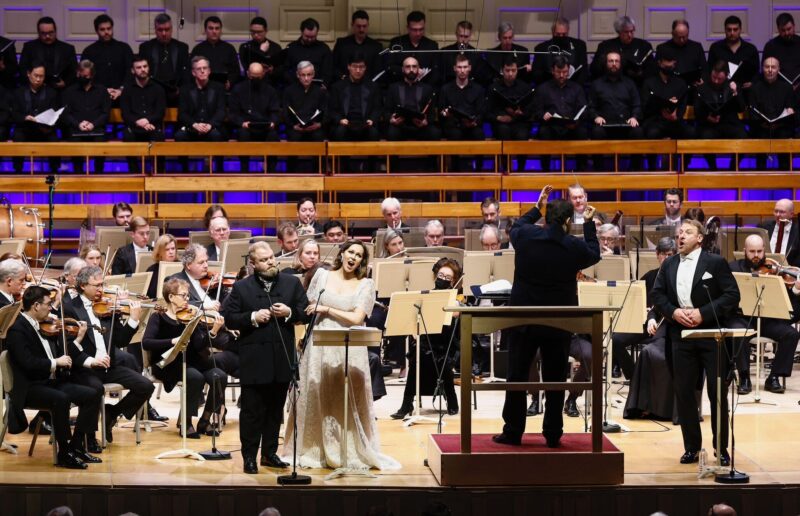Press | January 27, 2024


Press | January 27, 2024

Photo: Winslow Townson
“It’s been five years since the New York audiences have heard soprano Kristine Opolais. Once a stalwart at the Metropolitan Opera, the soprano has now dedicated herself to performing mostly in Europe and seeking “something special” in the productions or performances she does.
And in her return to New York, the soprano found that “special something” in “Lady Macbeth of Mtsensk” at Carnegie Hall alongside the Boston Symphony Orchestra and Andris Nelsons …
In the role of Katerina Ismailova, Opolais was singing her third performance in a series of concerts of the Shostakovich masterwork. Opolais relished the role giving us different facets to her character. In the first act aria, she displayed a more secure personage and played into the satirical elements of Katerina’s boredom. Her phrasing was a bit more exaggerated but the legato line remained smooth and cool as she sang about boredom.
But that quickly evolved into something seductive and chaotic as she yielded to the advances made by Brenden Gunnell’s Sergey. The voice obtained a wild energy and blossomed on the high notes emphasizing the sexual tension of the scene. The articulation was also clear and well-accented and you could feel that Opolais was taking in each phrase with joy.
During the Act two duet that opens with Sergey and Katerina, Opolais and Gunnell caressed each line with lyrical phrases that reflected the ethereal nature of their relationship. That would quickly turn during the confrontation with Günther Groissböck’s Boris Ismailov. Here Opolais’ voice opened up as she sang the wild syncopated lines of Shostakovich’s music with vigor, her voice climbing with incredible flexibility over the heavy orchestra. Her high notes also brought immense power into the hall.
In the second scene of the second act, one started to see Opolais’ Katerina change. Here Opolais gave into the tremor and fear of the character as she sang some of her lines with an eerie pianissimo whisper. There were also many disconnect lines and the sound turned to a straight tone, perfectly effective for the moment.
The Act four aria, where Katerina is pushed to her limits, saw the soprano at her most dramatic. She sang with a lyrical line that emphasized the text with clarity. Then there were moments where she almost spoke the line with a shudder and other moments where you could just hear her voice reflect a lament. It was powerful in every way.
At the end of the night, Opolais received a well-deserved massive ovation as she proved once again why she is one of the best singing actresses currently performing. In 2025, audiences will get to see her Katerina in Leipzig, but let’s hope the soprano is allowed to return to the New York stage and audiences won’t have to wait another five years for her next appearance …
Then there were the intimate moments, like Katerina’s inner monologues, where Nelsons conducted with a softer, more intimate sound that allowed Opolais the time to express her character. This was an orchestra that showcased so many shades and made for one of the most compelling operatic performances in New York this season.
For all those who missed this momentous occasion, Deutsche Grammophon will release a recording of this opera and it is truly a treat that should not be missed.”
“Kristine Opolais sang Katerina as the exegesis of femininity. By the end of the night, it was more than attested that her Katerina had few doubts about her desirability or her right to be the center of attention. As a result, the character became a bit more of a tragic heroine and less of a psychological study of a distant cousin of Madame Bovary.
Opolais’ voice, significantly more lyrical than the Wagnerian army that has embraced the role in the last few decades, worked well in creating dignifying sounds, especially during the inner monologues that make the character so welcoming. Her pianos are almost spoken, without any vibrato, in a smooth and bright voice that progressively unwraps into a volcanic cornucopia of vibrato in the fortissimos …
Her quiet and tender voice sounded more and more threatened by Günther Groissböck as Boris’ looming ubiquitous backstage voice. The louder Boris’ spectral voice sounded, the quieter and weaker Katerina sang—as if we were witnessing the oppressing of a lady that, in another environment, might be capable of being remarkable without murdering anyone … Opolais is aligned with Nelsons’ innovative approach to Shostakovich and does create something new.
To my mind, the success of her performance of femininity reaches its peak when she mourns the death of Boris. In a rather comic moment, Opolais sang it almost as if Katerina believed in the loss of her father-in-law. The irony flourished precisely because it was entirely non-ironical singing. Moreover, in an opera where the insincerity of social conventions is so criticized, it is, to say the least, a kind of revenge to believe that Katerina has mastered the art of social disguise.”
Operawire
“Simmering tension manifested with barely audible tremolos from the low strings, and Kristine Opolais’s Katerina’s crumbling grief in the final act was traced with solo oboe and English horn …a perfectly complex Katerina, a character who is set up to fail by a series of despicable men. Vocally, she was excellent, fire wreathed in ice.”
The Boston Globe
“Yet, as Thursday’s performance of the original, four-act 1932 version demonstrated, Lady Macbeth is really the key to unlocking Shostakovich’s larger style. Though after the Fourth Symphony he never again wrote such raucously dissonant music, the chief aspects of his later output—the quick shifts of tone; the raw virtuosity; the uneasy marriage of irony, sarcasm, and profundity utilized as subtle social and political commentary—all coalesce masterfully here. So, too, moments of penetrating vulnerability, like Katerina’s two arias in Act 4.
On Thursday, Kristine Opolais delivered both of those with searing intensity and a focus to match. She offered much the same in her compelling traversal of Katerina’s big Act 1 aria where the character laments her lonely, loveless life.”
The Classical Review
“… Katerina Izmailova, which she sang for the first time in these concert performances with the Boston Symphony Orchestra (they were recorded for Deutsche Grammophon), was a qualified success.”
Parterre
“… she has returned to the city in good, poignant form. Opolais isn’t an imposingly aging, dramatic-soprano Katerina, but a faded, hardened yet still youthful ingénue … secure intonation and straightforward, never overdone expression. Playing the character as almost sleepwalking through a miserable life, she sounded and felt honest and true.”
New York Times
“She’s the kind of sympathetic, perceptive Katerina that justifies Shostakovich’s description of his heroine as a tragic figure. Katerina’s opening “I can’t sleep” aria can sound annoyed and entitled; Opolais is both humble and sad. Her soprano is full even in the upper register (where Shostakovich frequently sends Katerina), she’s not overwrought … At the end of “I can’t sleep,” she makes a mournful three syllables out of “kupchikhe” (“merchant’s wife”); when it’s time for bed at the end of the day, she’s piteous in singing of the “doors with locks on them.”
Her “Foal” aria is serene; she caresses the word “laskaet” (“caress”) and rises to “nikto” (“no one”) without shrieking. She sheds a tear for Zinovy before declaring that Sergei is her real husband; her lament for Boris sounds almost genuine, as opposed to the usual parody; against a luminous orchestral background, she’s radiant in telling Sergei “Your business is to kiss me.” (That doesn’t stop him from falling asleep.) Opolais’s acting, mostly with her face, is nuanced and intelligent and evinces a sense of humor. Her final aria, in which Katerina likens her conscience to the huge black waves of a lake in the wood, is quietly chilling … when this Lady Macbeth is released, with Kristine Opolais in the title role, you should buy it, regardless of what other versions you might already have. It’s Shostakovich at his very best.”
The Boston Musical Intelligencer
“Kristine Opolais wore two gowns with puff sleeves designed expressly for these performances – one white (Acts 1 and 2), the other black (the final two acts).
Her Katerina is trapped, her sleep-deprived life a waking, draining nightmare, the Izmailov Estate her prison, the men around her a cavalcade of toxic masculinity. She may have a given name but no identity, other than “the merchant’s wife”. Initially, Opolais embodied a wraith, her voice monochromatic then full of glacial resentment and disdain when provoked by her father-in-law and husband. Flashes of more began to appear in the second scene, first when she rebukes the abusive workers and decries the lot of Russian women, then when she accepts Sergei’s challenge to wrestle. Though his love is a mirage not an oasis, it lights a fire in her: a frenzied hunger for a life to be lived and at any cost. After Sergei’s betrayal on the march to Siberia, she is drained once more, dead as soon as she realizes his love is false.
Opolais remained onstage, once again blank and still, Katerina a ghostly presence as her own death unfolds. Her acting was riveting, colored by her sensitivity to the words, and well served by her singing … overall this was an imaginative and powerful performance.”
Bachtrack
“Kristine Opolais soldiered through the long, taxing title role with admirable stamina … she made her points through fearless high attacks and outbursts that managed to sail above the orchestra even at full volume. She found dramatic moments wherever she could, as when Katerina removes her stockings at Sergei’s request—so that he can give them to his prison lover, Sonyetka. Opolais gamely lifted her dress and performed the final moments barefoot, looking both crushed and angered as she realized her partner’s transgression.”
Parterre
November 5, 2025
Roderick Cox, conductor Kristine Opolais, soprano Mika Kares, bass